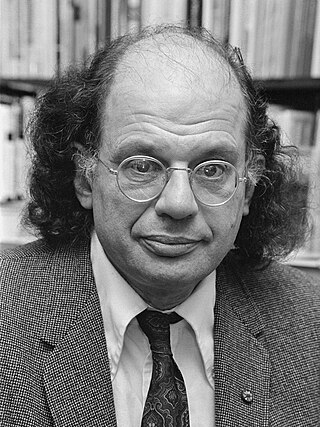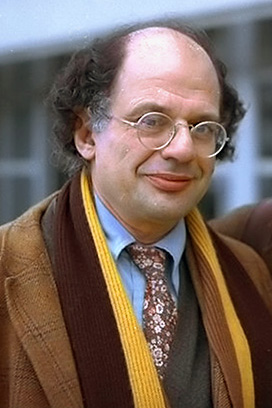
Irwin Allen Ginsberg was an American poet and writer. As a student at Columbia University in the 1940s, he began friendships with Lucien Carr, William S. Burroughs and Jack Kerouac, forming the core of the Beat Generation. He vigorously opposed militarism, economic materialism, and sexual repression, and he embodied various aspects of this counterculture with his views on drugs, sex, multiculturalism, hostility to bureaucracy, and openness to Eastern religions.

The Beat Generation was a literary subculture movement started by a group of authors whose work explored and influenced American culture and politics in the post-World War II era. The bulk of their work was published and popularized by Silent Generationers in the 1950s, better known as Beatniks. The central elements of Beat culture are the rejection of standard narrative values, making a spiritual quest, the exploration of American and Eastern religions, the rejection of economic materialism, explicit portrayals of the human condition, experimentation with psychedelic drugs, and sexual liberation and exploration.

"Howl", also known as "Howl for Carl Solomon", is a poem written by Allen Ginsberg in 1954–1955 and published in his 1956 collection Howl and Other Poems. The poem is dedicated to Carl Solomon.
"Kaddish" also known as "Kaddish for Naomi Ginsberg (1894–1956)" is a poem by Beat writer Allen Ginsberg about his mother Naomi and her death on June 9, 1956.
Eric Drooker is an American painter, graphic novelist, and frequent cover artist for The New Yorker. He conceived and designed the animation for the film Howl (2010).

Peter Anton Orlovsky was an American poet and actor. He was the long-time partner of Allen Ginsberg.
"America" is a poem by Allen Ginsberg, written in 1956 while he was in Berkeley, California. It appears in his collection Howl and Other Poems published in November 1956.
"Pull My Daisy" is a poem by Allen Ginsberg, Jack Kerouac and Neal Cassady. It was written in the late 1940s in a similar way to the Surrealist “exquisite corpse” game, with one person writing the first line, the other writing the second, and so on sequentially with each person only being shown the line before.

The Fall of America: Poems of These States, 1965–1971 is a collection of poetry by Allen Ginsberg, published by City Lights Bookstore in 1973, for which Ginsberg shared the annual U.S. National Book Award for Poetry. It is characterized by a prophetic tone inspired by William Blake and Walt Whitman, as well as an objective view characterized by William Carlos Williams. The content is more overtly political than most of his previous poetry with many of the poems about Ginsberg's condemnation of America's actions in Vietnam. Current events such as the Moon Landing and the 1968 Democratic National Convention, the death of Che Guevara, and personal events such as the death of Ginsberg's friend and former lover Neal Cassady are also topics. Many of the poems were initially composed on an Uher Tape recorder, purchased by Ginsberg with the help of Bob Dylan.

Reality Sandwiches is a book of poetry by Allen Ginsberg published by City Lights Publishers in 1963. The title comes from one of the included poems, "On Burroughs' Work": "A naked lunch is natural to us,/we eat reality sandwiches." The book is dedicated to friend and fellow Beat poet Gregory Corso. Despite Ginsberg's feeling that this collection was not his most significant, the poems still represent Ginsberg at a peak period of his craft.

Howl and Other Poems is a collection of poetry by Allen Ginsberg published November 1, 1956. It contains Ginsberg's most famous poem, "Howl", which is considered to be one of the principal works of the Beat Generation as well as "A Supermarket in California", "Transcription of Organ Music", "Sunflower Sutra", "America", "In the Baggage Room at Greyhound", and some of his earlier works. For printing the collection, the publisher Lawrence Ferlinghetti, another well-known poet, was arrested and charged with obscenity. On October 3, 1957, Judge Clayton W. Horn found Ferlinghetti not guilty of the obscenity charge, and 5,000 more copies of the text were printed to meet the public demand, which had risen in response to the publicity surrounding the trial. Howl and Other Poems contains two of the most well-known poems from the Beat Generation, "Howl" and "A Supermarket in California", which have been reprinted in other collections, including the Norton Anthology of American Literature.
Allen Ginsberg Live in London is a DVD film of Allen Ginsberg reading his poetry, singing songs and performing a Tibetan meditation live on stage in London on Thursday 19 October 1995, at Megatripolis club-night at Heaven nightclub, London.

Kaddish and Other Poems 1958-1960 (1961) is a book of poems by Allen Ginsberg published by City Lights Bookstore.

"A Supermarket in California" is a poem by American poet Allen Ginsberg first published in Howl and Other Poems in 1956. In the poem, the narrator visits a supermarket in California and imagines finding Federico García Lorca and Walt Whitman shopping. Whitman, who is also discussed in "Howl", is a character common in Ginsberg's poems, and is often referred to as Ginsberg's poetic model. "A Supermarket in California", written in Berkeley about a market at University Avenue and Grove Street in that city and published in 1956, was intended to be a tribute to Whitman in the centennial year of the first edition of Leaves of Grass.

Howl is a 2010 American film which explores both the 1955 Six Gallery debut and the 1957 obscenity trial of 20th-century American poet Allen Ginsberg's noted poem "Howl". The film is written and directed by Rob Epstein and Jeffrey Friedman and stars James Franco as Ginsberg.
"Wichita Vortex Sutra" is an anti-war poem by Allen Ginsberg, written in 1966. It appears in his collection Planet News and has also been published in Collected Poems 1947-1995 and Collected Poems 1947-1980. The poem presents Ginsberg as speaker, focusing on his condemnation of the Vietnam War. It features imagery of the war and America's Heartland interspersed with news reports and cultural references. It is also written in Ginsberg's distinctive Whitman-like long-prose style.

Jessore Road is an International road connecting Shyambazar through Dum Dum in Kolkata, India to Jessore in Bangladesh. While the Dum Dum-Barasat sector is now part of NH 12, the Barasat-Petrapole sector is now part of NH 112. It continues in Bangladesh as N706 from Benapole to Jessore. The whole road is the part of Asian Highway 1. The road acts as a major link between places in and around Kolkata, especially Netaji Subhash Chandra Bose International Airport and Barasat. The road meets commuter (suburban) rail link at Barasat Junction railway station. Metro stations on this road include Shyambazar and Belgachia.

Songs of Innocence and Experience is an album by American beat poet and writer Allen Ginsberg, recorded in 1969. For the recording, Ginsberg sang pieces from 18th-century English poet William Blake's illustrated poetry collection of the same name and set them to a folk-based instrumental idiom, featuring simple melodies and accompaniment performed with a host of jazz musicians. Among the album's contributors were trumpeter Don Cherry, arranger/pianist Bob Dorough, multi-instrumentalist Jon Sholle, drummer Elvin Jones, and Peter Orlovsky – Ginsberg's life-partner and fellow poet – who contributed vocals and helped produce the recording with British underground writer Barry Miles.
Louis Ginsberg (1895–1976) was an American poet and father of poet Allen Ginsberg.
"September on Jessore Road" is a poem by American poet and activist Allen Ginsberg, inspired by the plight of the East Bengali refugees from the 1971 Bangladesh Liberation War. Ginsberg wrote it after visiting the refugee camps along the Jessore Road in Bangladesh. The poem documents the sickness and squalor he witnessed there and attacks the United States government's indifference to the humanitarian crisis. It was first published in The New York Times on November 14, 1971. Further to topical songs by George Harrison and Joan Baez, the poem helped ensure that the Bangladesh crisis became a key issue for the youth protest movement around the world.










